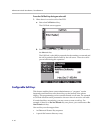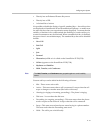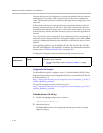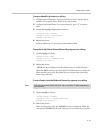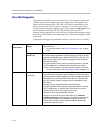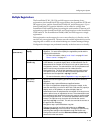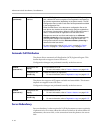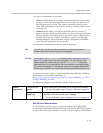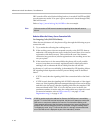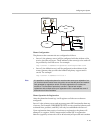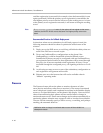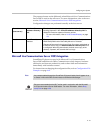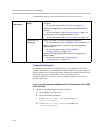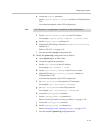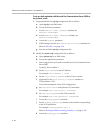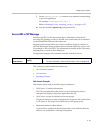
Administrator’s Guide SoundPoint IP / SoundStation IP
4 - 58
SRV records will be tried, before falling back on A records if NAPTR and SRV
records return no results. If no port is given, and none is found through DNS,
5060 will be used.
Refer to http://www.ietf.org/rfc/rfc3263.txt for an example.
Behavior When the Primary Server Connection Fails
For Outgoing Calls (INVITE Fallback)
When the user initiates a call, the phone will go through the following steps to
connect the call:
1. Try to make the call using the working server.
2. If the working server does not respond correctly to the INVITE, then try
and make a call using the next server in the list (even if there is no current
registration with these servers). This could be the case if the Internet
connection has gone down, but the registration to the working server has
not yet expired.
3. If the second server is also unavailable, the phone will try all possible
servers (even those not currently registered) until it either succeeds in
making a call or exhausts the list at which point the call will fail.
At the start of a call, server availability is determined by SIP signaling failure.
SIP signaling failure depends on the SIP protocol being used as described
below:
• If TCP is used, then the signaling fails if the connection fails or the Send
fails.
• If UDP is used, then the signaling fails if ICMP is detected or if the signal
times out. If the signaling has been attempted through all servers in the list
and this is the last server, then the signaling fails after the complete UDP
timeout defined in RFC 3261. If it is not the last server in the list, the
maximum number of retries using the configurable retry timeout is used.
For more information, refer to Server <server/> on page A-7 and
Registration <reg/> on page A-107.
Note
Failure to resolve a DNS name is treated as signalling failure that will cause a
failover.
Warning
If DNS is used to resolve the address for Servers, the DNS server is unavailable,
and the TTL for the DNS records has expired, the phone will attempt to contact the
DNS server to resolve the address of all servers in its list before initiating a call.
These attempts will timeout, but the timeout mechanism can cause long delays (for
example, two minutes) before the phone call proceeds “using the working server”.
To mitigate this issue, long TTLs should be used. It is strongly recommended that
an on-site DNS server is deployed as part of the redundancy solution.



